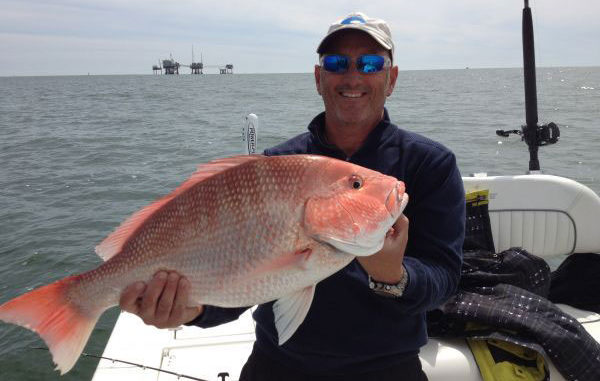
LDWF’s secretary says program could be too costly to administer for a single species
A surprise statement this week from Louisiana Department of Wildlife and Fisheries secretary Charlie Melancon opposing a bill in Congress that would transfer management of red snapper from the federal government to the five Gulf states has dented the previously unified front between the LDWF and Coastal Conservation Association – Louisiana, which has long-advocated for the switch on behalf of recreational anglers.
Under prior LDWF secretary Robert Barham and his administration, the department and CCA-Louisiana had joined forces in an attempt to wrest control of the Gulf’s red snapper fishery away from the the highly-politicized Gulf of Mexico Fishery Management Council and give it to each of the Gulf states’ five fisheries managers. Recreational anglers — who got an 11-day federal snapper season in the Gulf this month — have long complained the federal system is mismanaged and favors commercial fishermen.
But Melancon’s comments this week on H.R. 3094 — Rep. Garret Graves’ bill currently moving through Congress — now cast at least some doubt on Louisiana’s willingness to participate even if state management was eventually granted.
Money is the issue, Melancon said.
“Without federal funding, Louisiana could potentially lack the proper resources to manage the red snapper fishery,” Melancon said in the statement, which appears on undated state letterhead under the names of both Melancon and Gov. John Bel Edwards. “H.R. 3094 would not be a viable option for the Louisiana Department of Wildlife and Fisheries. It would be fiscally irresponsible for the Department to support any mandate that would result in an unknown amount of fiscal burden placed on the State of Louisiana for the management of a single species of fish.
“As a Department, we are charged with managing our fisheries resources for optimum yield; the same applies to our fiscal resources.”
CCA-Louisiana executive director David Cresson on Wednesday said Melancon’s comments opposing the legislation came as a shock.
“We were surprised and disappointed, especially since everything coming out of the Department up to now has been seemingly in favor of state management…” Cresson said. “We’ve been in contact with state fisheries managers and recreational anglers from the other states, and all were surprised and concerned.
“State fisheries managers are a big piece (of Graves’ legislation.) You’ve got the top fisheries folks from each state agreeing that this is a positive plan, and now all of a sudden, one of the states has pulled away. It’s discouraging.”
Cresson said he spoke by phone twice with Melancon on Tuesday after the secretary’s comments were made public.
“He called me after the statement was released and explained their position on it,” Cresson said. “I explained to him that I appreciated the call, but that we were certainly disappointed with their stance, and he understood that.”
Cresson said he was unsure of budgetary specifics that might preclude Louisiana from participating if snapper management were ultimately granted to the five Gulf states.
At least part of last year’s saltwater license fee increase was designed to support the LA Creel Survey Program, which uses ‘real time’ data collection to give state biologists better numbers on actual fish harvests in Louisiana waters.
“The LA Creel program is widely recognized as the best data collection program being implemented almost anywhere,” Cresson said. “And it’s doing work for all species, not just snapper. It’s speckled trout, redfish, drum, sheepshead — whatever you bring back to the dock.”
Despite Melancon’s lack of support, Cresson said Graves’ bill will continue to move through the legislative process in Washington, D.C.
“The bill will continue to make its way through Congress, and it’s got strong bipartisan support. It’s co-authored by just about every member of the Louisiana delegation, and it has strong support from the Gulf states,” he said. “We want what’s best for this resource, and we think better science is what’s best.
“The state’s have the best science and that’s been proven, and the Graves bill would give authority to the states to implement that science. We’re going to continue to work with all the players to create the best possible solution for this resource, and for Louisiana anglers.”
Chris Macaluso, director of the Theodore Roosevelt Conservation Partnership’s Center for Marine Fisheries, said he hopes Melancon and the LDWF eventually reconsider their position on the bill.
“Our organization supported that piece of legislation — as did the majority of the recreational fishing community — because we believe it’s a bipartisan way out of a federal management system that’s not working or functioning in the best interests of the people of the Gulf,” Macaluso said. “But it certainly is disappointing that the state that has championed the passage of this legislation — and has worked with anglers to demonstrate its ability to come up with better management for these fish — is now taking a position against this bill.
“I would hope the state would reconsider that position, especially considering that sportsmen of this state have consistently stepped up to provide the funding needed for the better management of fish and game in this state.”
Macaluso said he thought there would be several opportunities as Graves’ bill moves through Congress for the federal government to assist the Gulf states monetarily if snapper management is ultimately yielded to state fisheries managers.
“Congress recognizes that federal management of red snapper right now is very flawed, and they are stepping up with money to help remedy that problem,” he said. “It’s not like there isn’t evidence there that Congress is willing to help the Gulf states fund better research and better management of snapper. I think the reaction from this Department is disappointing in taking a position against this bill, considering there are opportunities to address any funding shortcomings.
“Both the governor and the secretary pledged early on that it was their intention to push for,and work for state management of red snapper. I would hope that they remember that promise.”
A spokesman for the LDWF did not return a phone call for comment on potential cost projections for state management before this article was posted. LouisianaSportsman.com will update this story as more information is gathered.


